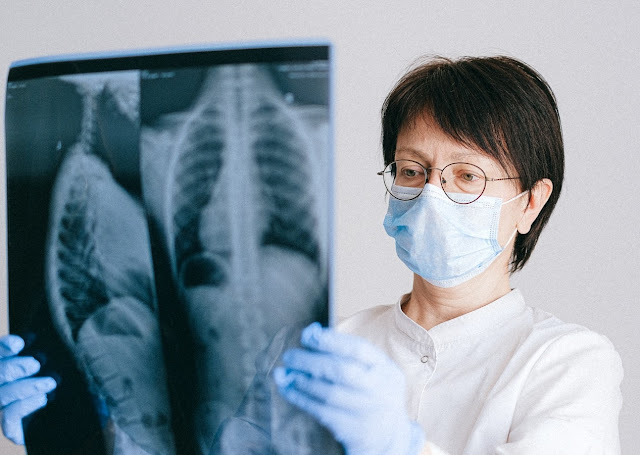Celiac Disease Model, Organoids
 |
| Time Out for a Daily Salad? YES!😍 |
In the past few days, a study was published about "organoids" being used to learn more about Celiac Disease. This is new, but not brand new, since organoids have been used to study Inflammatory Bowel Disease (a condition that's 1/5th as common as Celiac). The technique has already given us new insight into Celiac, but has some limitations, so let's look more closely at it.
What's an Organoid?
An organoid is like having a model of the gut (like you might see in a doctor's office) but it works better because it's made up of human tissue kept alive in a laboratory setting. It can be used to learn more about a disease that affects human tissues like the epithelium of the gut. Where is it from? Biopsy tissue that's collected in routine tests might be grown in a lab, then placed in an organoid giving researchers a new way to study a disease. (Fans of Star Trek may be mildly amused by "matrigel's" similarity to "biomemetic gel.")
My first thought about this is... couldn't we once and for all prove whether cholesterol is a danger to blood vessels, or not, using this technique? After all, blood vessels are also "epithelium" tissue... but that's outside the scope of this article.
Which Studies?
Human gut derived-organoids provide model to study gluten response and effects of microbiota-derived molecules in celiac disease. May 7, 2019
https://www.nature.com/articles/s41598-019-43426-w
Part of Abstract: "Monolayers derived from CD organoids exposed to gliadin showed increased intestinal permeability and enhanced secretion of pro-inflammatory cytokines compared to NC controls. Microbiota-derived bioproducts butyrate, lactate, and polysaccharide A improved barrier function and reduced gliadin-induced cytokine secretion. We concluded that: (1) patient-derived organoids faithfully express established and newly identified molecular signatures characteristic of CD. (2) microbiota-derived bioproducts can be used to modulate the epithelial response to gluten. Finally, we validated the use of patient-derived organoids monolayers as a novel tool for the study of CD."
-- Which microbiota derived bioproducts? They're talking about intestinal permeability being reduced by things your gut flora produces like butyrate. Apparently, this helps prevent or delay CD activation. A useful insight for your family members.
As a matter of interest, this study is about Necrotizing Colitis (2018)
https://www.cmghjournal.org/article/S2352-345X(18)30021-3/fulltext
This one isn't about Celiac Disease, but uses the organoid model. Interestingly, Dr. Alessio Fasano is listed as a coauthor.
What Have We Learned So Far?
There is considerable variation in how different people with Celiac Disease respond to gluten. (Gee, could've guessed that from Reddit, hehe.)
One of the ways you can track the effects of a disease is by how the body adapts through epigenetic changes (meaning, which DNA/genes you're currently using, and which are dormant). They found hundreds of differences between CD to Non-Celiac (NC) patients. "we found 472 genes differentially expressed (fold change greater than 2, FDR < 0.05) between the two groups. Of them, 291 genes were downregulated and 181 were upregulated in CD compared to NC"
Zonulin, and gut permeability plays a role in activating CD in a person who has the genes that make CD a potential problem. It sounds like they're thinking to prevent CD by strengthening the gut barrier function. That doesn't help those who already have it, but it may help to prevent it.
At one point they're talking about the dysregulation of stem and progenitor cells. Stem cells are a favorite tool of many health spas right now. Most of them grow your own stem cells (harvested from your blood) and give you back a larger amount than normal. Stem cells can become other types of cells and they are very much needed to heal the body. Your body produces them all the time and uses them to replace used up and malfunctioning cells.
Because of my general debility, I'm considering having the "blood drawn and grown" type of stem cell therapy, but I wanted to mention that there are different types of stem cells. There's a controversial marketing push toward the fetal stem cell therapy with people claiming that it's better (I don't really know if that's true). If it can be shown that the non-controversial stem cell therapy can heal the gut it could be of enormous benefit to new Celiac patients whose gut could heal in much less time than today's prognosis of 1-3 years.
Another advantage is that I don't have to cringe whenever I read studies of gut disease because they tortured some poor animal for my benefit. Consider me 100% on board with organoid use instead of rat torture. When I thought I might have Crohn's Disease I routinely skipped the methods section of studies, because it was unbearable to read. I'm infinitely relieved that organoids will reduce that problem, and I hope it totally eliminates it.
What Are the Limitations of Organoids?
- They only study the organ in question.
- They can't tell you how it affects your liver, thyroid or kidneys (or any other organ).
- They can't include the environmental challenges of a real patient. For example, if a patient lives near a factory and is continually exposed to fumes, it can lead to a worsening of any illness they may have, including Celiac. These are "confounders" in science, but they're very real for patients. In short, organoids are not "wholistic" and we shouldn't expect them to be.
- They aren't perfectly the same as a human being, any therapy would still need to go through human studies to see if it helps.
- Although there may be a lot of variation in the real world, they may be selecting the most simple examples to use as organoids, which may leave the "atypical" patients out in the cold again.
None of these objections are large, as long as people keep in mind the limits of this technology. It's still the best tool I've heard of in studying gut disease and can really help people.
So have you heard of organoids before? What do you think of it?




